News
Accusations against me have no substance – pardoned X NSSF boss Chandi Jamwa.
Published
2 years agoon
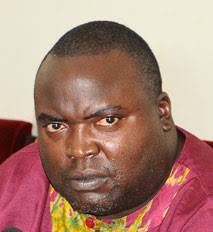
Yesterday the President of Uganda pardoned 13 prisoners who were facing various sentences including David Chandi Jamwa who was the Managing Director for National Social Security Fund who was ssntenced to 12 years in prison over fraud.
Below is his statement as he was in Courts battling cases of corruption after his suspension!
I have read carefully the reasons why I was supposedly sent on suspension as Managing Director of the National Social Security Fund (NSSF). I admit that I am not perfect. Indeed, no one ever is. Yet my alleged faults are of a tactical, not a strategic nature. My role as MD at NSSF was to increase return on members’ savings by making smart investment decisions. Therefore, judgment of my tenure there should be on that basis.
I have been accused of taking salary advances to the tune of Shs 229 million. I am an employee of NSSF. My appointment letter says all my terms and conditions will be governed by the staff handbook and the staff policies. Under the policy, I have the right to obtain a staff loan for housing up to five years salary. My five year salary is close to Shs.800million. I did not take that loan.
So salary advances of Shs 229m are far below what I was entitled to as a loan. Therefore, the only way NSSF would be at risk is if I am unable to repay it in my contract time period.
I am also accused of not coming to office regularly and that when I did I would come in casual wear. First, in modern management, a CEO does not need to be always physically in office to be effective. The issue really is whether I was doing my job, not how many hours I spent in office. I used to dress smart casual ‘” in my NSSF branded shirt, then trousers which are slacks. My feet are sick with gout plus ingrown nails, so I wear open shoes.
When I joined NSSF, I found staff members with so many problems. No one was interested in their problems, they were not being enumerated properly, they were not having any morale boosting, and they were basically like orphans. When I went round during my diagnostic meetings to the branches of NSSF, one of the staff members described EXCO [Executive Committee] as ‘˜stiff-necked bastards’. The distance between staff and management was because management was walking around in ties; they could not be talked to and would lock themselves in their offices. So I removed all curtains in all offices to create openness in the place.
The only way to galvanize staff was actually the process of demystifying management. The easiest way was for us to be the same ‘” both managers and staff. We all began to wear branded shirts, to have pride in the Fund, to move together as one ‘” an open door policy. There is always resistance to change. The dress-down policy is an empirically proven modern management policy. The way to precipitate significant change is to have significant change drivers. I was that driver.
I was also accused of abusing the NSSF credit card yet I pay all my credit card expenses from my money. The day I was suspended, the amount on my card was zero. On the American Express card, the limit is molded automatically with your usage rate. For example, in six months, if you have used US$ 5000, the limit automatically resets it to US$10,000. In the next six months if you use US$ 20,000 the limit automatically resets to US$ 30,000. Did I use any of the workers’ money on the credit card? The answer is no. Do I owe NSSF or any of those companies on that credit card any money? The answer is no. Who paid that money? The answer is Jamwa.
Regarding how much money I took home, I can only say that somebody’s financial status can never be the size of his pay check. In my case, my wife is the head of treasury, Centenary Bank. She buys all the food at home and pays all the fees. I have personal investments and companies; my consultancy company, my real estate company and so on. I came to NSSF on a salary cut. When I left PWC (PriceWaterhouseCoppers) my salary was Shs 500million a year. At NSSF, it is slightly above Shs 200 million a year. I went to NSSF to put a mark on the development of this country. As the reader might notice, these accusations against me are on form, not substance.
The more substantive accusation is Lumumba Avenue. This project was initialed 15 years ago. There have been more redesigns of Lumumba than the fingers on my hands, long before I joined the Fund. It is a project that has suffered perennial close downs and re-starts. When I joined NSSF that old design had already been tendered. The design was 10 years old. It was very uneconomical. So it would have been completely absurd to continue with it.
For example, the old design lacked basic things like air conditioning and lifts. How can NSSF be seen to be erecting a building of the 1980’s in the 2000’s? A good manager must challenge areas of value leakage. The new design was approved by the board and it sat on the minister’s desk until Temangalo exploded and it has sat there for at least five months now.
Be that as it may, when you have a contract under PPDA, you are allowed variation up to 25%. We are at the ground excavation level. At that level, the difference between the old and the new design is the number of floors downwards i.e. three extra floors. Assuming the redesign is approved, to go the three extra floors down, there is no problem. Assuming it is not approved; if we went down the three extra floors would it make the old design more economical? Yes. I did a modification of the old design within the old design that is allowable. And that variation is within the 25%.
NSSF has never ever implemented the new design. The contract is for the old design. That is why there needs to be variations to accommodate scenarios like this. I use a variation to go down so that when the minister and KCC approve, we have not lost time, we do not have a contracted site with one floor waiting for six months for a ministerial approval. Secondly, if the minister does not approve, we go up with our old design which has been amended within the old contract and is modified to make the building more economical. I never gave an order to begin construction. If you go to Lumumba Avenue, you will not find any construction there except a hole.
The NSSF headquarters.
Achievements
For the workers who save with NSSF, the substantive issue is whether I made smart investments that would increase the return on their savings. When I joined NSSF, I found it overly conservative in its investment policy. For example, 80% of the portfolio was invested in very low risk, low earning assets such as treasury bills, treasury bonds and some unnegotiated fixed deposit accounts; accounts that were below market. There were lines of credit with DFCU, HFCU that were not gaining market value. They were lent out at fixed rates yet market prices had gone up. When I reached NSSF, only 5% of the portfolio was invested in equities and the remaining 15% was in mostly defunct real estate investments like Nsimbe and loss making investments like Workers’ House.
Thus, in 2008 NSSF had already written off 50% of Nsimbe as an investment. In accounting, until you have exercised all possible means of recovery you cannot write off anything as an investment. At the end of this financial year, after trying to recover from James Mugoya, we discovered that that amount was not recoverable. So this year it will be written off 100%. Yet it is so easy to sort out this Nsimbe problem.
Mugoya has 860 acres. It is all his. However he is persona non grata in Uganda. His name has been tarnished. He cannot come to Uganda because there is an arrest warrant out for him. Under these conditions, he can negotiate. Currently, that land could be Shs 15 million an acre. When you multiply it by 860 acres, it is about 13 billion. We can ask him to discount money NSSF paid him, around 8 billion and NSSF pays the balance of Shs 5 billion and takes the land into its names. Having something is better than nothing. The value of that land exceeds the money he ate off NSSF. Then once he has paid back all this money, the rest of these things would fall off. He could come back to Uganda and see his relatives and enjoy the liberties of life.
By the time of my suspension, I had made tremendous progress on NSSF plans to develop a modern 3,000 houses housing estate in Lubowa. The plans were going to the board for approval. These houses would have been sold before we put foundation. The plan is to build apartments (like those in Bugolobi), bungalows and mansions. Three bed-roomed apartments would go for Shs 160m; four bed-roomed bungalows for Shs 260m each and five bed-roomed mansions for Shs 360m.
I had inherited problems with Lubowa. These are some of the historical problems we had. There was a joint venture signed up with Sole Bonier International (SBI), the company repairing all the main highways. Legally, NSSF had to find a way to move forward with them otherwise we would have gone back to an Alcon situation where we are supposed to pay over US$ 10 million in compensation for breach of contract. I told people, isn’t NSSF tired of paying people money for not doing any work?
So, I provided the solution; a structure in which the developer becomes the lead consultant. There is a joint venture between NSSF and that developer. The person building will be publicly procured to avoid conflict of interest. In terms of financial participation, the developer gets their percentage and has no rights on the profits from the houses since they don’t own the land. I cancelled the original Lubowa arrangement since it was a raw deal. Originally, Lubowa was very much like Nsimbe because SBI was the joint venture partner, there was some capital they were going to inject, and they were also the contactor for construction. They would also enjoy some profits on the houses yet the houses and the land were completely NSSF property.
The main thing here was to rebalance the investment mix of NSSF to 30% in fixed income assets, 40% in real estate and 30% in equities. In fixed income, the first rebalance we did was to move money away from the treasury bills and bonds for Bank of Uganda. Secondly, we were able to convert that low earning money to high earnings with no increase in risk. So we began to ask banks to bid for our fixed deposits. They did and this increased our annual earnings from about 11.5% to about 15%.
We also shifted money into equities, changing their contribution in NSSF’s portfolio from 5% to 25%. Some of this money bought shares in Stanbic, DFCU, Safaricom, Serena. These equity investments increased the return on NSSF money to 38% per annum as opposed to 10 or 11% we were making on fixed income assets. The only area that did not move as per plan is the movement of money from treasury bills to real estate because of the political controversies involved in real estate investments. I increased returns on everything and made a profit of Shs 130 billion, more than twice what the second largest financial institution in this country, Stanbic did.
I stopped member cheque scam. There was a syndicate within and without the Fund that used to identify juicy cheques to steal. The people inside would give all the data on the client but they would change the photograph. They would open an account, pay the money into it and eat it. There was also another scam of fraudulent employment. NSSF employed people with fraudulent papers, low qualifications. I sacked 150 people. I established a system whereby no one can pass through the system and get employed without having their papers validated. There were ‘air’� supplies. Then I busted NSSF defaulters; I made Bank of Uganda pay us out Shs 18 billion.
I found NSSF paying only 6% return on members’ savings and I increased this, within one year, to 14%. Finally, I had initiated a health insurance plan for all NSSF members so that without them having to pay anything, they would be medically insured. The insurance premium would be paid from the profits on their savings without reducing on the return on their savings. I have been unfairly judged by many people. But I know that history will give me a fair judgment and it will be a glorious judgment.
You may like
-
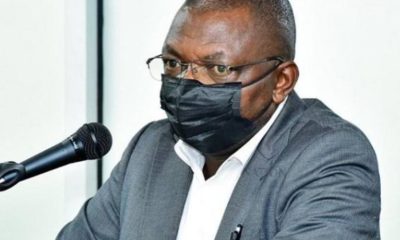

Police Officers’ Qualifications Confirmed in Commissioner Mugume Dispute
-
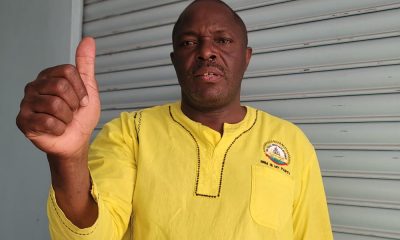

NRM Tribunal Orders EC to Declare Ruhaama County Results in Two Days
-


Is Jailed Police Human Resource Commissioner Mugume a Victim of a Hit Job?
-
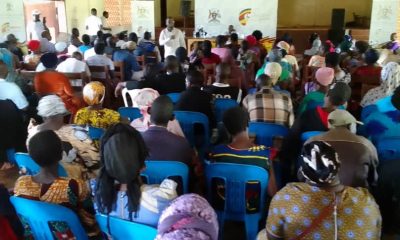

Security Agencies , Hongera Saana Uganda/Office of the President Offer Free Trackers to Boda-Boda Riders
-
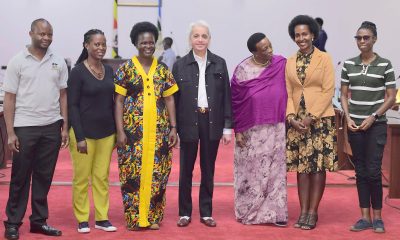

Patriotism Commissioner Hellen Seku Taps into Benny Hinn’s Blessings at State House
-


Dr Charles Ngabirano Nominated for Rwampara East MP Seat, Vows to Complete Key Projects


